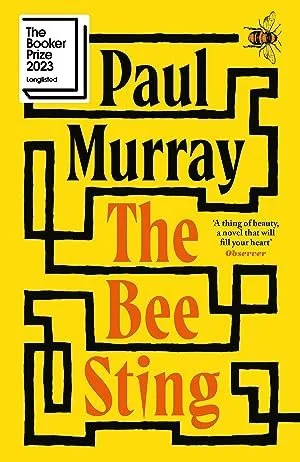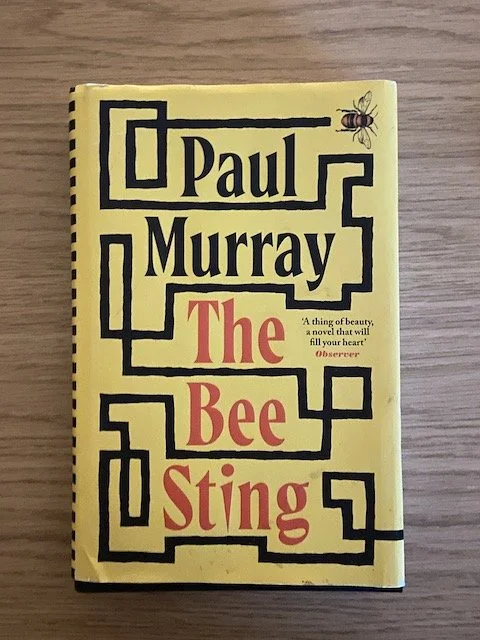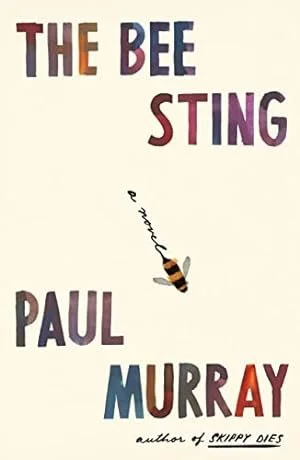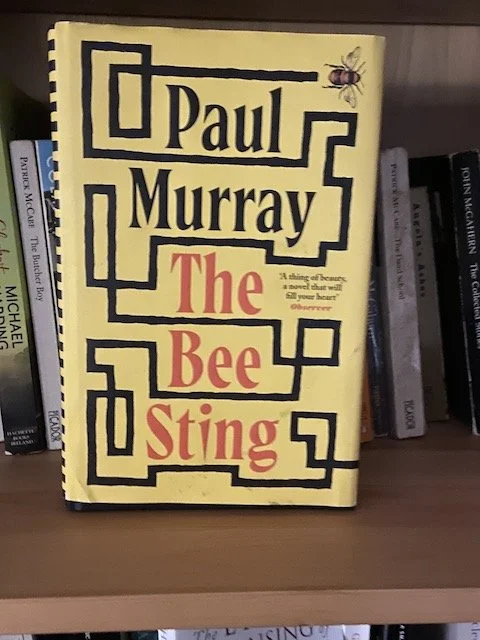Book Review - The Bee Sting by Paul Murray
The Booker Prize nominated 'The Bee Sting' by Paul Murray has been on my TBR pile for a while now. It's a big book, with a distinctive black and yellow cover, so it's been hard to ignore. Also prominent has been the raft of recommendations I've been seeing from my book friends, so I thought it was about time I got to it.
It's the story of the Barnes family, residents of an unidentified Irish midlands town, who are in a bit of bother. The car dealership that has supported them is struggling badly, battered by the financial crash and mismanagement. The good times are certainly over and the family feels like it is falling apart.
Throughout the novel, we hear from each of the family members, as they struggle with the various predicaments in their lives. Father and husband Dickie is refusing to acknowledge his problems and burrowing himself in the ground. Unhappy wife Imelda is forced to sell her treasured belongings on eBay. Teenage Cass is on the verge of going to university but slowly going off the rails. Twelve-year-old PJ is caught between his online life and real events, wondering if he has finally had enough of his toxic family life.
Skippy dies
'Skippy dies' by Paul Murray was one of the first books we read in our book club, all the way back in 2012. I remember it being a tragicomedy, written with a frenetic energy and a narrative that just pulled you in. It was about a bunch of teenage boys at a college, that included everything from drug dealers to Celtic mythology and doughnuts. It was a riotous coming-of-age story that I enjoyed.
'The Bee Sting' is a big book, weighing in at over 600 pages but I wouldn't let that intimidate you as you get swept along by each character's distinctive voice. The long first sections introduce you to each of the characters before we return to them with shorter alternatives as the book progresses until the ending of the book, which reaches a terrific crescendo until the characters are all on one page.
Cass
I read an interview with Paul Murray recently where he said that Cass was the first character to come to him. She's 17 years old, a wannabe poet on the cusp of university but who is completely enthralled by her friend Elaine, very much the golden girl. She's led astray, though it doesn't take much, discovering boys and booze in the small town they live in.
PJ
Poor PJ. He escapes the poisonous atmosphere at home by spending time in the woods near the family home and disappearing into the online world. Murray captures PJ so well, the young boy wanting to be popular but becoming more and more isolated. He finds himself being bullied and the only way out he can see is by running away from home.
For PJ, the world can collapse just as easily as his parent's marriage. And by seeking solace in the online world, he puts himself in even more danger, in a storyline that that will terrify many parents.
Imelda
I think Imelda ended up being my favorite character. There's no punctuation in her Molly bloomesque chapters, capturing her breathless nature and the sense that her life is cartwheeling into a disaster that she can't prevent. She has the most interesting backstory, the local beauty, 'the most beautiful woman in the four provinces' born into abject poverty with a father who enjoys bare knuckle fighting, and an aunt with the ability to see the future, though not the good parts.
There's tension with Imelda because she leaves this background and finds herself in a middle-class life with Dickie and the kids. She's desperately trying to hang on to this life, the only one aware of what it is to live a hand-to-mouth existence. She's been there and doesn't want to go back. At the same, she's drawn to her father, who treated her as his little princess, and her beloved brother Lar, with whom she used to dream of escape. She can't forget where she came from.
The bee sting of the title comes from Imelda - on her way to get married, a bee got stuck under her veil and stung her face, forcing her to remain veiled the rest of the day. I won't spoil the backstory to this, but let's just say the build-up wasn't the most straightforward.
Dickie
Dickie's method of dealing with his problems is by hiding from them. His father, now living in Portugal, left him the car dealership which has been hit badly by the financial crisis and his own mismanagement. He has no idea how to improve things, and his thoughts turn to the impending doom of his life by decides to build a bunker in the woods.
Tragicomedy
We the reader can see how the problems the characters face often overlap or are connected to their shared family past. Cass and Dickie are much more alike than either cares to acknowledge. But they are so disconnected from each other they can't see this.
There is a lot of grief and trauma in the book, with Dickie and Imelda particularly weighed down by the past and the decisions they took. At times it feels crushing, like they are each going to disappear under the weight of their pain. There's a particular part of the book, at the heart of their relationship, that is beautifully vivid in its description of all-consuming grief, as fine as anything I've read recently.
The family collapse is also mirrored by that of the environment. From the floods and droughts to the sense of impending doom as exemplified by Dickies determination to build a shelter to protect his family. He can't protect them from real life, so he imagines a future life where he can. At the same time, PJ, terrified by the thought of his parent's breakup, cannot deal with the harsh realities of survival, which include dead squirrels.
Families
Paul Murray captures the big tangled mess of family life so well. The destructive father-son relationships, sibling rivalry, pushing grief, trauma, and problems into a place where you don't have to deal with. Until you do, because the past has a habit of repeating itself.
'The past remains with us, in all kinds of unexpected ways. If we haven't made peace with it, it will come back again and again.'
Before he became a father, Dickie imagined the relationship as being like an intensive version of owning a pet. The child, he thought,
'was essentially a passive, a vessel into which you poured your love. On TV that’s how it looked. Children were silent, dormant; you went into their bedrooms, gazed down at them fondly, drew the blankets over them as they slept.
But in life, he discovered, parenthood was like – it was – living with a person. A new person, with strong opinions, strong tastes, arbitrary swings of emotion, all of them addressed at you. You were the passive one: the work of care was primarily to endure, to weather the endless, buffeting storms of unmediated will.”
It's also a seriously funny book. So many times I laughed out loud, often on occasions when I shouldn't but sure those are always the blackest, funniest moments for humor. There's one incident that involves some writing on someone's arse that had me in stitches.
There's also a lot in this book about discovering your identity, especially when you are young. Each generation has different ways of dealing with this, and perhaps in the modern era there are more pressures, but maybe we aren't so different after all in our approaches.
Audiobook
As I mentioned earlier, I have a physical copy of this but I'm not sure if I would have enjoyed it on audiobook. The reason was that each characters voice had such a distinctive rhythm and cadence that it felt they were singing to me in my head. I love dialogue in a book, and this was rich and immediate - what a writer.
If there's one book I could compare this too it would probably be Crossroads by Jonathan Frantzen. It’s also about a family, and it darkly comic and tragic, as we learn the inner lives of the Hildebrandt family as they experience a moral crisis.
Ending
I have seen some discussion online about the ending of the bee sting. My reaction was that I found it....hmmmm. Gotta be careful here. I was happy enough because I felt there was enough foreshadowing in the earlier parts of the book, and numerous occasions throughout. I'm not saying it made me happy but it felt like Paul Murray had prepared me for it - it wasn't a complete surprise. But yeah, I need to get talking to someone about the ending of the book, it's been rattling around in my noggin for days now.
The Bee Sting summary
This book has got a terrific frenetic energy to it, and Murray has a particular skill in getting under the skin of each of the characters, in writing each of them with such a distinctive voice. He cares deeply for them, presenting their flaws and mistakes, but always making them human. Takes some doing, but within a couple of sentences I was completely immersed in the story of that character.
Many of the financial pressures faced by the family, as well as the angst generated by our online lives, will be familiar. Add in the sense of impending environmental disaster, and Murray has tapped into something universal in all of us, and not just a dysfunctional family from the back end of nowhere.
This is equal parts heartbreaking and hilarious, very often on the same page. I found myself being completely absorbed by each characters story, and their rich inner lives, as the book builds to what feels will be a disaster. I think I read the last few pages through my fingers. What an ending.
If there's a message in the book, it's one I've been thinking about a lot recently. Not to sound trite, but it's about how important it is to live in the present, to not be consumed by the past, which you cannot change. There's a story of local myth in the book, about a man resting on a hillside who is invited to a party with the local 'fairy folk'. He enjoys the hedonism, but when he awakes it's a hundred years later and his family is gone. Blink and you'll miss it, as messy and problematic as life is.
Whether it wins the Booker Prize or not, and I think it deserves to, this absorbing, heartbreaking work of distinctive storytelling is unlike any other I've read this year and deserving of all the plaudits and accolades it deserves.
656 pages, Hardcover
Published August 15, 2023





